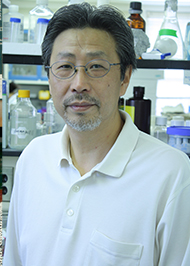Taixing Cui, M.D., Ph.D., FAHA
Professor, Department of Medical Pharmacology and PhysiologyOffice Location: 222A DCRC
Office Phone: 573-882-3244
Lab Phone: 573-884-0436
taixingcui@health.missouri.edu
Research Interests
- Posttranslational protein modification and protein quality control
- Super enhancers
- Cell fate and phenotype regulation
- Extracellular microvesicles
- Mechanotransduction
Research Description
Our laboratory has a research interest in understanding the nature of cardiovascular adaptive responses as well as maladaptive remodeling and dysfunction in diverse pathological settings. We have focused on the intercellular and interorgan communications in cardiovascular adaptation and maladaptation. We take multi-disciplinary approaches to explore the underlying cellular and molecular atlases and to identify the novel therapeutic targets for cardiovascular disease.
There are four areas of technical strengths in our laboratory: 1) Conventional and inducible cardiovascular tissue-restricted genetic manipulation in vivo; 2) Genetic inducible fate mapping of endothelial cells, vascular smooth muscle cells, adventitial fibroblasts, and resident cardiovascular stem cells in vivo; 3) Cardiovascular physiology analyses in cell, organ and whole animal levels; 4) Conventional and high throughput analyses such as single cell or nuclear RNA sequencing (scRNA-seq or snRNA-seq) and Special Transcriptomics (ST) analyses in vitro and in vivo.
Four major research programs which are currently underway include:
- To identify novel cellular sources and molecular switches of vascular lesion formation, repair, and regeneration
- To identify novel regulators of cardiac protein quality control
- To identify novel interorgan communications between the heart and adipose tissues
- To identify novel energy transformations in cardiovascular mechanotransduction
Professional Background
- VA Research Investigator, 2021-2022, Columbia VA Health Care Systems, Wm. Jennings Bryan Dorn VA Medical Center, Columbia, SC 29209, USA
- Associate Professor (tenured), 2016-2022, Department of Cell Biology & Anatomy, University of South Carolina School of Medicine, Columbia, SC 29208, USA
- Assistant Professor (tenure track), 2007-2016 Department of Cell Biology & Anatomy, University of South Carolina School of Medicine, Columbia, SC 29208, USA
- Assistant Professor (research track), 2006-2007 Cardiovascular Center, University of Michigan, Ann Arbor, MI 48109, USA
- Instructor (research track), 2003-2005 Cardiovascular Research Institute, Morehouse School of Medicine, Atlanta, GA 30310, USA
- Assistant Professor, 2001-2003 Department of Medical Biochemistry, Ehime University School of Medicine, Ehime 791-0295, Japan
- PhD, 1997-2001, Ehime University School of Medicine, Ehime 791-0295, Japan
- Visiting Physician Scientist, 1995-1997, Department of Medical Biochemistry, Ehime University School of Medicine, Ehime 791-0295, Japan
- Nephrologist, 1991-1995, General Hospital of Air Force of the People’s Liberation Army (PLA), Beijing, P.R. China
- Residency, 1989-1991, General Hospital of Air Force of the People’s Liberation Army (PLA), Beijing, P.R. China
- MD, 1983-1989, The Fourth Military Medical University, Xi’an, P. R. China
Selected Publications
Wu W, Hendrix A, Nair S, Cui T. Nrf2-mediated dichotomy in the vascular system: Mechanistic and therapeutic perspective. Cells. 2022, 11(19), 3042
Wu W, Qin Q, Ding Y, Li DS, Nagarkatti M, Nagarkatti P, Wang W, Wang X, Cui T. Autophagy controls Nrf2-mediated dichotomy in pressure overloaded hearts. Front Physiol. 2021 May 13:12:673145
Zang H, Wu W, Qi L, Wenbin Tan, Nagarkatti M, Nagarkatti P, Wang X, Cui T. Autophagy inhibition enables Nrf2 to exaggerate the progression of diabetic cardiomyopathy in mice. Diabetes. 2020 Dec;69(12):2720-2734
Zang H, Mathew RO, Cui T. The dark side of Nrf2 in the heart. Front Physiol. 2020 Jul 9;11:722.
Qi L, Zang H, Wu W, Nagarkatti P, Nagarkatti M, Liu Q, Robbins J, Wang X, Cui T. CYLD exaggerates pressure overload-induced cardiomyopathy via suppressing autolysosome efflux in cardiomyocytes. J Mol Cell Cardiol. 2020 Jun 14;145:59-73.
Wu W, Wang C, Zang H, Qi L, Azhar M, Nagarkatti M, Nagarkatti P, Cai G, Weiser-Evans MCM, Cui T. Mature vascular smooth muscle cells, but not endothelial cells, serve as the major cellular source of intimal hyperplasia in vein grafts. Arterioscler Thromb Vasc Biol. 2020 Aug;40(8):1870-1890.
Li KC, Wang CH, Zou JJ, Qu C, Wang XL, Tian XS, Liu HW, Cui T. Loss of Atg7 in endothelia cells enhanced cutaneous wound healing in a mouse model. J Surg Res. 2020, 249:145-155
Wang X, Cui T. Autophagy modulation—A potential therapeutic approach in cardiac hypertrophy. Am J Physiol Heart Circ Physiol. 2017 Aug 1;313(2):H304-H319.
Qin Q, Qu C, Niu T, Zang H, Lyu L, Wang X, Nagarkatti M, Nagarkatti P, Janicki JS, Wang XL, Cui T. Nrf2-mediated cardiac maladaptive remodeling and dysfunction in a setting of autophagy insufficiency. Hypertension. 2016 Jan;67(1):107-17.
Lyu L, Wang H, Li B, Qin Q, Qi L, Janicki JS, Nagarkatti M, Nagarkatti P, Janicki JS, Wang XL, Cui T. A critical role of cardiac fibroblast-derived exosomes in activating renin angiotensin system in cardiomyocytes. J Mol Cell Cardiol. 2015 Dec;89 (Pt B):268-79.




